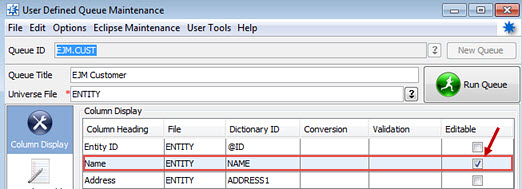
After you create your queue, you can add additional options and modify how the queue displays and retrieves information.
Assign and authorize users for queues after you create them.
After you create a queue and save it, you can view it in several ways:
|
To... |
Do this: |
|
display a queue to edit the settings or adjust the design... |
|
|
display the queue results... |
|
|
display your queue... |
Use your user-defined menu, to locate your queue. |
If a dictionary is added to a column or header that has prompts set up in Eclipse Dictionary Maintenance, then the system displays a warning icon alerting the user that the prompts must be answered prior to running the queue. For example, if you use the PRODUCT file, the dictionary item MIN requires you to select either "Branch/Territory/All" or "Ignore Branch Hierarchy" so the system knows what to do with the information it is gathering. If you enter more than one branch, using this example, the queue generated the system will contain a Branch column and a Branch header field on which to sort or filter the results.
This logic pertains to the following options in the Column Display and Header Field tabs:
Column Link ID
Column Prompts
Column Dictionary Prompts
Header Field Link ID
Header Field Prompts
Header Field Dictionary Prompts
To view prompts for your queue:
Display the queue you created.
From the Options menu and select Select Prompts to display the options for your queue.
When creating a queue the system works much like Mass Load for editable fields. If you select a dictionary from which to create a queue and that dictionary has attributes which you can edit using Mass Load, then the system allows editing of those same fields through the queue you are creating. You can decide if you want to allow users to edit the fields when the queue is used by selecting the check box in the Editable column for the line item.

The system alerts you if you cannot update a record. You may be able to enter information when displayed in a queue, but Eclipse will not update the values to the database. Users can exit and try to save the information again.
Note: You can select multiple lines with the same values to edit them altogether.
As with many queues in the system, you can download your user-defined queue to a spreadsheet for further review and managing. Once downloaded and saved, you can open it in Excel®.
Use the Download to Excel® option:
Display the queue you want to download.
From the Options, select Download to Excel®.
Save the file to your computer and return to the queue.